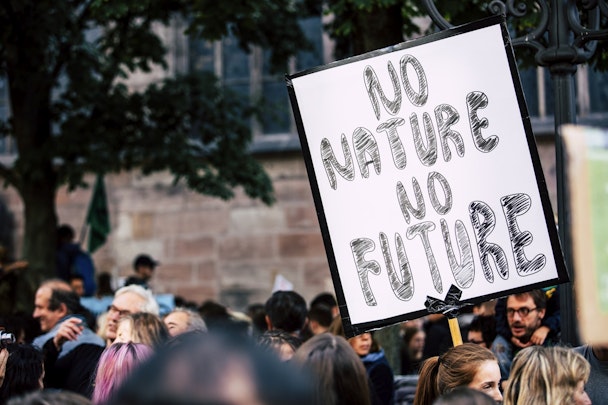Chris Gorell Barnes: why the UN General Assembly gave me hope for responsible advertising
Was it a coincidence that last week New York played host to Climate Week, Advertising Week and the heavily climate-themed General Assembly of the UN? Or a metaphysical sign that climate crisis and advertising have become inextricably intertwined?

Chris Gorell Barnes: Responsible advertising?
Last week, of course, was also defined by two seismic political events: the so-called ‘Leader of the Free World’ faced the prospect of impeachment and the UK prime minister’s actions were deemed unlawful. As the new world order of political turmoil descends into metaphorical (and perhaps even literal) meltdown, it’s heartening to know that our more respectable leaders used the General Assembly to piece together a plan to save our planet.
As the saner politicians rallied around Mother Nature, so did our little corner of the world when Advertising Week NYC discussed ad land’s role in perpetuating climate crisis by encouraging consumerism. Needless to say, Advertising Week was clearly also about creativity, strategy, equality… and – thanks to an unbelievably misjudged finale courtesy of Pitbull and four half-naked, objectified, twerking women – sexism. But for me, the standout session discussed capitalising on advertising creativity to stymie the tide of climate crisis.
So all credit to The Drum for its ‘How Advertising Can Change The World’ panel. Alongside Comic Relief’s chief executive, WPP’s chief marketing officer, One Tree Planted’s director and this fine magazine’s editor, we thrashed out how ad land can change the world for the better and while not all of the discussion was around the crisis climate, it was evident that there is a growing desire for the industry to discuss it. More than there was earlier this year at least.
In another prescient sign that advertising and climate crisis are becoming inseparable, ahead of The Drum session I was lucky enough to speak at The FT’s breakfast on impact investing and the General Assembly of the UN’s launch of The Lion’s Share. A simple but brilliant brand opportunity to help stem species extinction and ecosystem collapse, The Lion’s Share encourages advertisers that feature nature or animals in their comms to donate a ‘royalty’, in the same way that actors and celebrities are remunerated. The resulting fund is then used to protect the featured species and Mars deserves a shout-out for being an early adopter.
Aside from BoJo’s dystopian rant about AI, my day at the UN ended in optimism. Not only did Greta give the adults a grilling, Melinda and Bill Gates’ Goalkeepers event was also a real highlight: India’s (somewhat questionable) prime minister Narendra Modi outlined his campaign to rid the country of single-use plastic and New Zealand’s premiere Jacinda Ardern made the room sit up and take note with a refreshing and inspiring talk about refusing to subsidise the fossil fuel economy and looking through the eyes of a child to evolve national success metrics beyond GDP and economic growth by reflecting health and wellbeing.
Back in the intersection of ad land meets the UN, the Brand Avengers session got some of the world’s biggest brands to talk about how they will hit their 17 UN Global Goal targets in 2020. Representing 17 areas spanning education, health, social protection, equality, climate crisis and biodiversity threats, the Avengers sees 17 of the world’s biggest brands (a cohort including Coca-Cola, Diageo, Google, Nike and Unilever, totalling over $500 billion in revenue) take ownership of one Goal each. Co-ordinated by Richard Curtis’s Project Everyone, the legendary director did a typically stirring job of reminding us how to use brand storytelling to drive awareness around the Global Goals.
So what did this intense New York week teach me? After years of lip service, the advertising industry is at last coalescing to combat the world’s social and environmental ills. And being given a platform at the UN’s General Assembly proves that our ability to change businesses’ and people’s behaviour for the better is being taken seriously. But the job is far from done. There’s still too much ”purpose” talk and not enough action.
Although initiatives like The Lion’s Share and Create & Strike indicate a move in the right direction, we won’t make a significant impact until we fundamentally change the way brands market themselves and their products. For example, why haven’t we implemented Pavan Sukhdev’s ‘responsible advertising’ framework? Inspired by the food labelling traffic light system, environmental economist and activist Sukhdev rightly believes we can help consumers and citizens better understand a product’s environmental impact if its labelling includes a simple code alerting buyers to the product’s eco credentials.
Sukhdev was definitely on to something when he published his idea back in 2012. But in the intervening seven years, we still haven’t made the necessary systemic changes. That said, climate crisis rises further up ad land’s agenda as each year passes. Meanwhile, time-honoured institutions like the Dow Jones are investigating ways of measuring corporate success beyond shareholder value, and the business world is realising we can’t trust our increasingly lawless and cavalier politicians to solve the climate emergency. So it really does feel like we’ve reached a tipping point. And perhaps, just perhaps, 2020 will be the year when advertising finally gets responsible.
Chris Gorell Barnes is the founder and chief executive of Adjust Your Set and co-founder of marine conservation organisation Blue Marine Foundation
